11+ Sample Probation Contract
-
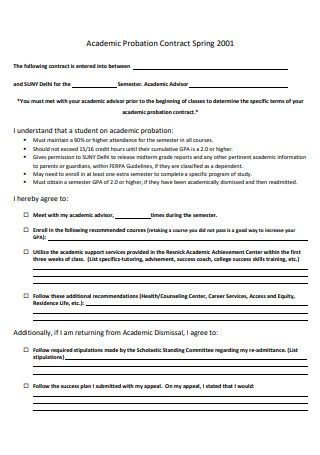
Academic Probation Contract
download now -
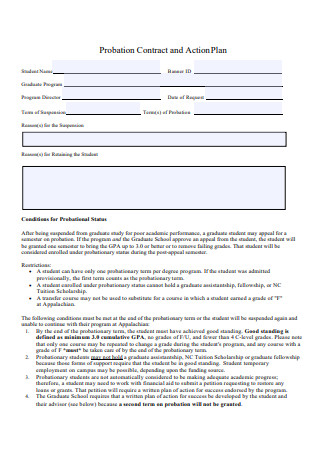
Probation Contract and Action Plan
download now -
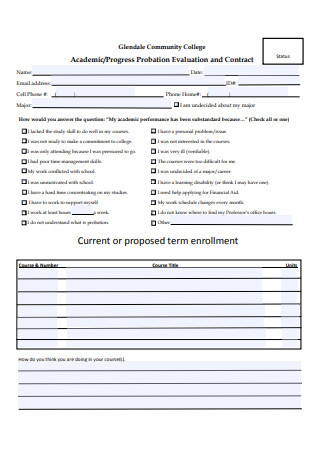
Progress Probation Evaluation and Contract
download now -
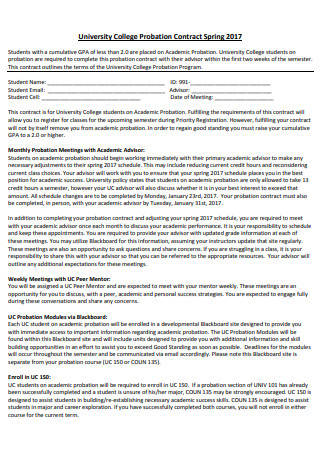
College Probation Contract
download now -
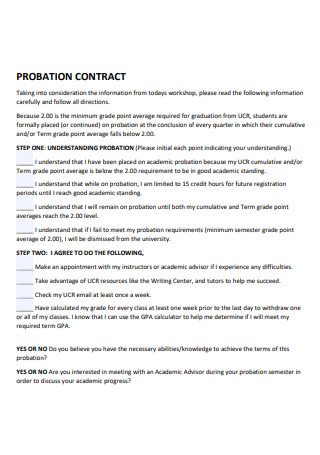
Basic Probation Contract
download now -
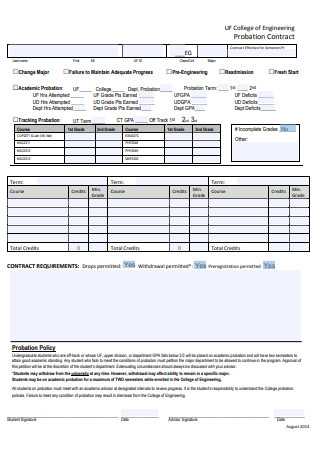
Engineering Probation Contract
download now -
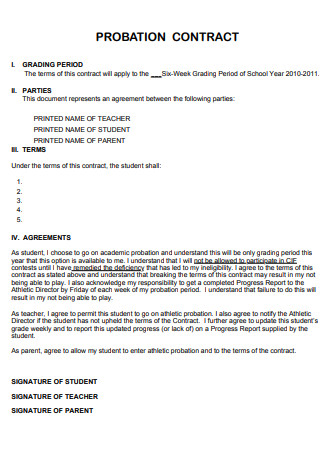
Formal Probation Contract
download now -
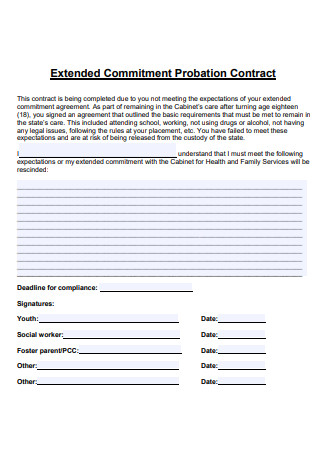
Commitment Probation Contract
download now -
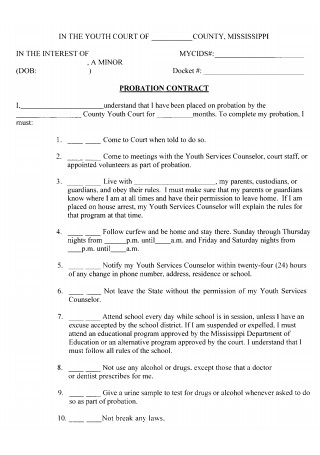
Probation Contract Template
download now -
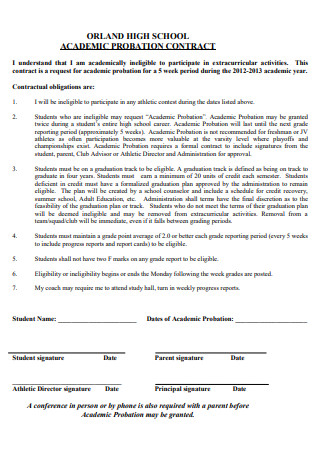
School Academic Probation Contract
download now -
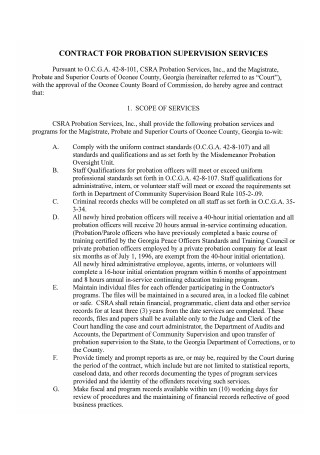
Probation Services Contract
download now -
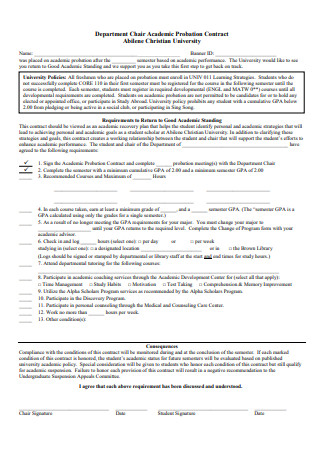
Department of Academic Probation Contract
download now
FREE Probation Contract s to Download
11+ Sample Probation Contract
What is a Probation Contract?
What is a Probationary Period?
Why Do Employers Use Probationary Periods?
Basic Components of a Probation Contract
How to Successfully Carry Out a Probation Contract
FAQs
What is a Probation Contract?
What Happens at the End of a Probationary Period?
Do we get Salary during the Probationary Period?
Who is Placed Under Probation Period?
In this article, you will learn about what a probationary contract is and how it functions as a layer of protection for employers and helps them to recruit employees that are suitable for the organization. The article also comes with 11+ probation contract that you can download to understand better how it should look like and what it should be composed of!
What is a Probation Contract?
Probation Contracts are prepared by employers who wish to legally subject a potential employee in a trial period or what is called as the employment ‘probationary period letter’ to monitor their performance and assess if their work ethics, skills, and capabilities are appropriate for the job they have applied for.
Like most employment contracts, it details the responsibilities an employee under probation must perform as well as the salary they can enjoy and the benefits or the lack thereof that they can be entitled to receive considering they are not regular employees. The contract can also outline the reason as to why the probationary period is imposed. It also has to include how long the employee is under a probationary period and what they can be eligible for once this period is over because the company still can reserve its rights to decide whether or not a probationary employee’s successful execution of the probationary period comes with what they can consider as a satisfactory performance that is on par with the standards they wish their employees should meet.
Sometimes, a separate probation contract is not prepared but can rather manifest itself as a clause in the employment contract.
What is a Probationary Period?
A newly hired employee shall be required to complete a period, usually ranging from three to six months, sometimes a year, depending on the employer. This period can be extended for a maximum number of days mutually agreed upon by the employer and the employee. This period of employment proposals is called a probationary period and shall be served as soon as the employee is hired.
The employer shall use this period of time to evaluate if the employee is appropriate for the job description they applied for and if their performance meets expectations otherwise, they can wield the power to terminate the employee for something as simple and final as unsuitability even without prior notice or payment in lieu which shall also be detailed in the contract with the employee’s full understanding and consent. To avoid a termination with such harsh nature, it is then up to the employee to take the responsibility of making the best of the probationary period and deliver exemplary performance to retain their position and even be up for regularization with access to higher pay and more benefits.
Why Do Employers Use Probationary Periods?
The primary and maybe even obvious reason as to why probationary periods are enforced for new employees to complete is so that an employer can protect themselves from having to commit to a payment agreement with an employee that falls short on the company’s expectations and therefore might affect the overall performance of the team and the quality of the outputs that ultimately can ruin the business’ brand. While that’s an elaborate timeline that is yet to happen, it is a timeline that still has a likelihood to be possible if it weren’t for the probation period. However, it isn’t the only reason. Below are some more purposes that a probationary period serves.
1. It narrows down the best employees to keep.
While most individuals who submit their job application form see to it that their resumes can best reflect what they are capable of, the real mirror is actual work done in real time that employers can evaluate. Even recruitment plan processes that include the most nerve-wrecking and anxiety-inducing interviews to truly test if an applicant deserves to get hired can usher candidates that unfortunately, will disappoint as soon as the real work comes. While it’s a given that they are intellectually capable, there are things beyond our control that might affect our performances and will reflect on the work. A probation period can then make sure that only the employees that can manage the business’ workflow, the respective employee work schedules and business operation plans all the while having to deal with external factors that usually are personal, can complete the full duration and remain. This makes it easier for employers to grant either promotion for an employee who’s served the probation period or extend their existing duration to assess the performance longer.
If it seems like a survival game show, it’s most likely because only the most competent employees who can work under pressure should remain in a company that has a lot to lose if it were to retain employees that do not perform the desired manner to keep the organization fully-functioning and afloat.
2. It monitors new hires.
A common purpose that a probationary period serves is because it allows employers to monitor the performances of the newly hired employees and assess how they shall perform given that work under a probationary period can entail having to be stationed or do work that does not exactly coincide with your line of expertise, something that your probation contract shall also include. While it can seem unfair to judge performance plans you had no background on, it’s still one way to assess if an employee is up to the challenge of having to learn something new in order to contribute to the company which in hindsight, could be a moral lesson that should be learned and applied.
3. It allows employees a window of opportunity to flex.
Like what was mentioned in passing, the probation period is also likewise beneficial to the actual probationary employees in the sense that it gives them the opportunity to perform the roles assigned to them appropriately and exemplary. With the knowledge that this is the same period where their performances are under probationary evaluation, this can motivate them to do better in their respective fields with intent to convince their employers of their suitability for the job positions especially if they see themselves working for the company for a long period of time. While an off-putting analogy, a probation period can be used to sell oneself to prove that they meet the qualifications for permanent employment to the employer.
4. It allows employee assessment.
Similarly, a probationary employee can use the probation period to make their own self-assessment and ponder if the company can provide a work environment they can work for and have to go through a probation period typically ranging from three to six months only to probably fail along the way or not make it in the end.
5. It helps in performance improvement.
A probationary period can be used as time for existing employees to pick themselves up from having been slacking and underperforming. Likened to a warning, it allows for employees to improve their performance and maybe even develop a learning plan for themselves through which they can follow through and work on what needs to be corrected. Similarly, an employer can also craft employee development plans to help employees render better service.
Basic Components of a Probation Contract
1. Standards of Regularization
Probationary contracts shall explicitly detail the company’s standards that will qualify them to become regular employees for the obvious reasons that an employee understands how to adequately perform his roles so as to secure the status that will grant him access to higher pay and a semblance of stability since regardless if a probationary employee does pass and become regulars, they still face the probability of being terminated.
2. Length of Probationary Period
In general, probationary periods should only last for three to six months. If the contract allows a provision for the employer to extend this, it shall not exceed a year as this can be deemed unfair to the employee regardless if it cannot be helped that ample time is needed to further monitor their performance. It is important that the probationary understands how long they are to be under probation more so when the contract stipulates the option for an extension because if not, the employee would have automatically passed the probation period and the employer can no longer make an agreement with the employee for an extension.
It’s also not enough to only mention the option for an extension of the probationary period but it shall also be set in writing the instances where to resort for an extension should be taken which typically can be more time for the employer to address and correct a probationary employee’s deficiencies. If it isn’t obvious enough, but a key to writing an effective contract be it for joint venture contracts, car rental contracts or apartment lease contracts, is writing it with transparency that shall be read, understood and consented to by both parties. Otherwise, contractual disputes should be inevitable.
3. Notice of Completion and Termination
The contract or the clause should also be sure to explain how an employee is determined to have passed the probationary period. Some employers would want to deliver a written notice of confirmation letter as proof of the employee’s successful completion. If an employee fails, it is the duty of the employer to inform what could have been the reasons as to why the employee was not able to pass the probationary period and this should be supported by documentation proving this to be the case. Failure to present evidence could be used as leverage by the employee if they were to make a legal claim against the employer despite the latter having the legal right to exercise terminating employees if they think it necessary. Even the promptness of how an employer breaks it to the employee that they cannot proceed to securing the job position should be noted because if the employer missed to inform the employee and a good period of time has lapsed since the intended end of the probationary period, this could serve as grounds for legal dispute.
Likewise, a written notice of job termination letter should also be served to the employee if they fail to meet the qualifications of the company within reasonable time before the termination date.
4. Termination Procedure
While poor performance in the job is considered grounds for termination, an employee can have a legal claim if the probationary period were to violate what was stipulated in the contract which is essentially violating the law. It is thus important that the contract is able to outline the causes that may provoke termination of an employee. Detailing the grounds to fire someone will serve as evidence that whatever the reason could be is within the contract that the employee has agreed to therefore preventing the fired employee from crying wrongful termination letter.
How to Successfully Carry Out a Probation Contract
According to the Labor Relations Act (1995), the employer is expected to perform certain obligations in order for the probationary period to be a meaningful one for the employee and the company but most importantly to ensure that the probationary period is not a condition to be abused but subject everyone to a fair procedure. Some of these obligations are:
Inform the employee.
For an employee to successfully complete the probation period, it is important that they fully understand what the job contract entails. It can’t be helped that in the midst of excitement or rather anxiety to start the first of work, an employee can miss certain clauses or provisions in the contract with regards to their probationary period. It can even be because of the language that the contract is written in that may cause employees to overlook what it could mean in favor of just going through an employment contract they think they understand the gist of. It is thus important that an employer is able to word the contract in a way that can be easily comprehended and encourage an employee to raise questions should confusion arise. What an employer can explain more on aside from clarifying the length of the probationary period are reasons that can serve as basis for dismissal and under what terms and conditions the employee is subjected to in order to successfully complete the probation period and avoid from violating what may lead to their failure.
While in the midst of informing the employee of their kind of employment, it is important that the employer assures them that the probationary period is well within reasonable and legal conditions.
Call for regular feedbacking sessions.
Ideally, an empathetic employer should also desire for performance improvement plans for probationary employees not only so that they can retain the job but for the organization’s overall performance as opposed to the harsh way that is exploiting their legitimate right to fire an employee for poor performance and make room for potential employees with more competence than the former employee. The employer can schedule one-on-one sessions with the purpose of informing maybe a current employee put under disciplinary probation of their performance and on what specific aspects they can look to improve. While it will seem like an additional job for the employer, it’s the humane approach that will encourage growth and improvement and ultimately will improve work efficiency of the organization.
Provide additional training.
Sometimes, it is not enough to pinpoint where an employee seems to be having problems with. A proactive employer who seeks for improvement for all can provide supplementary training that can show an employee how to correct their lapses. This can be extremely helpful for employees placed under probation for a job promotion. Not only shall an employer provide supplementary training, but they can also call for periodic employee performance evaluation reports and counselling for the employee to allow them to constantly improve and render service that in the grand scheme of things, is essentially beneficial to the whole company.
FAQs
What is a Probation Contract?
A probation contract is an illegally binding agreement between an employer and an employee that should define the nature of the probation employment status among others. It is prepared and can manifest as a clause within an employment contract to ultimately protect employers from hiring employees that do not sufficiently perform the assigned roles to them.
What Happens at the End of a Probationary Period?
As soon as the probationary period ends, the employer should be able to report the employee’s employment status and provide documentation that supports their decision. It could either be to inform an employee they’ve successfully passed the probationary period or fail or if the current employee placed on probation who is up for promotion passes.
Do we get Salary during the Probationary Period?
Probationary employees are still eligible for salary however, it may be less compared to the salary of a regular employee. In some cases, employees under probation period do not get to enjoy benefits but should still be entitled with the same rights as that as his regular peers.
Who is Placed Under Probation Period?
- New employees
- Current employees who are up for promotion
- Current employees who are facing disciplinary measures
This article ends with a quote from Divina Law, “For those on probationary employment, may you prove your worth. For the employers, may you find the worthy.”
